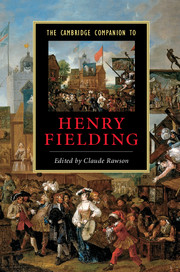Book contents
- Frontmatter
- Introduction
- 1 Henry Fielding’s life
- 2 Fielding’s theatrical career
- 3 Shamela
- 4 Joseph Andrews
- 5 Jonathan Wild
- 6 Tom Jones
- 7 Amelia
- 8 Fielding’s periodical journalism
- 9 Fielding and female authority
- 10 Fielding on society, crime, and the law
- 11 Fielding’s style
- 12 Fielding’s afterlife
- Guide to further reading
- Index
- Series List
9 - Fielding and female authority
Published online by Cambridge University Press: 28 July 2007
- Frontmatter
- Introduction
- 1 Henry Fielding’s life
- 2 Fielding’s theatrical career
- 3 Shamela
- 4 Joseph Andrews
- 5 Jonathan Wild
- 6 Tom Jones
- 7 Amelia
- 8 Fielding’s periodical journalism
- 9 Fielding and female authority
- 10 Fielding on society, crime, and the law
- 11 Fielding’s style
- 12 Fielding’s afterlife
- Guide to further reading
- Index
- Series List
Summary
When Henry Fielding, his second wife Mary, and Fielding’s daughter Harriet set off for Lisbon in 1754, they were accompanied by Margaret Collier. The voyage did not improve his relationship with this old family friend. In the final weeks of his life Fielding was troubled by his wife’s desire to return to England, and Collier, in his view, encouraged her 'Folly'. Moreover, Collier was behaving ridiculously, he thought, acting the 'fine young Lady of Portugal, a Toast of Lisbon', and trying to attract Mr Williamson, the English minister. 'He is smitten', reported Fielding, 'and she would succeed, if I did not prevent it. She is indeed the most artful wicked B - in the world'. After Fielding’s death Collier wrote to the novelist’s great rival Samuel Richardson, mentioning Fielding, if less rudely than he had written of her, still in implicitly hostile terms. People, she complained, were attributing the Journal of a Voyage to Lisbon to her on the grounds that it was inferior to Fielding’s other works and must have been written by his female companion: ’this is the disadvantageous light poor women are held in, by the ill-nature of the world'. She appealed for sympathy to Richardson 'as the only candid man, I believe, with regard to women’s understandings; and indeed their only champion, and protector, I may say, in your writings; for you write of angels, instead of women'.
- Type
- Chapter
- Information
- The Cambridge Companion to Henry Fielding , pp. 122 - 136Publisher: Cambridge University PressPrint publication year: 2007

